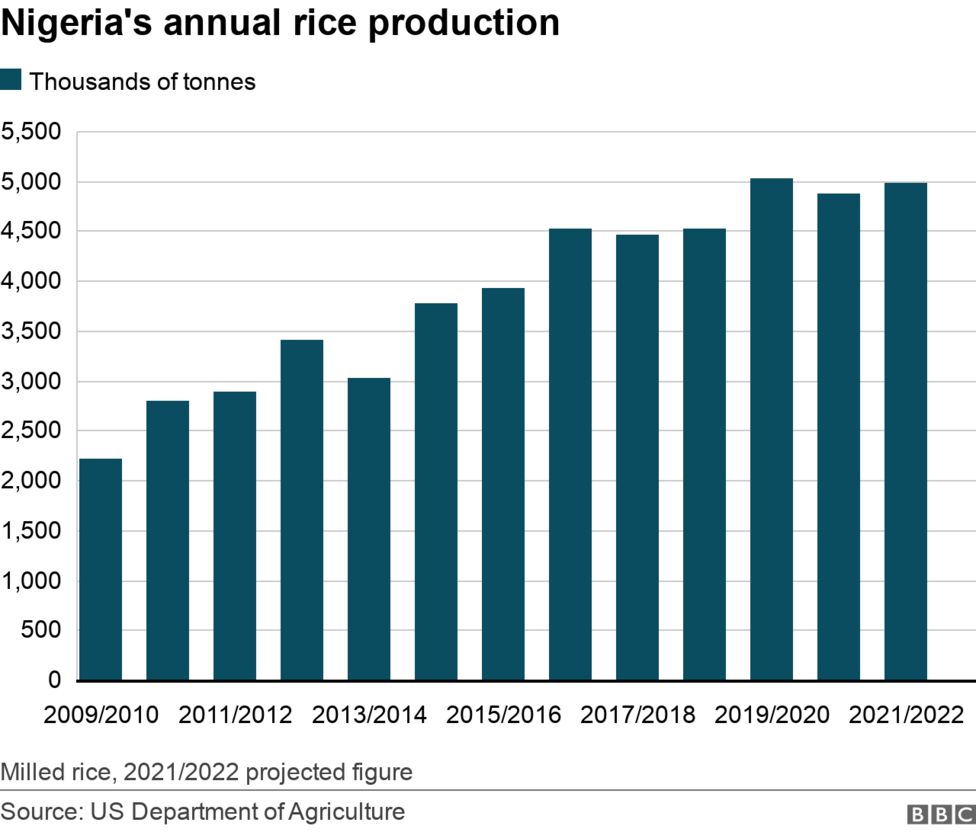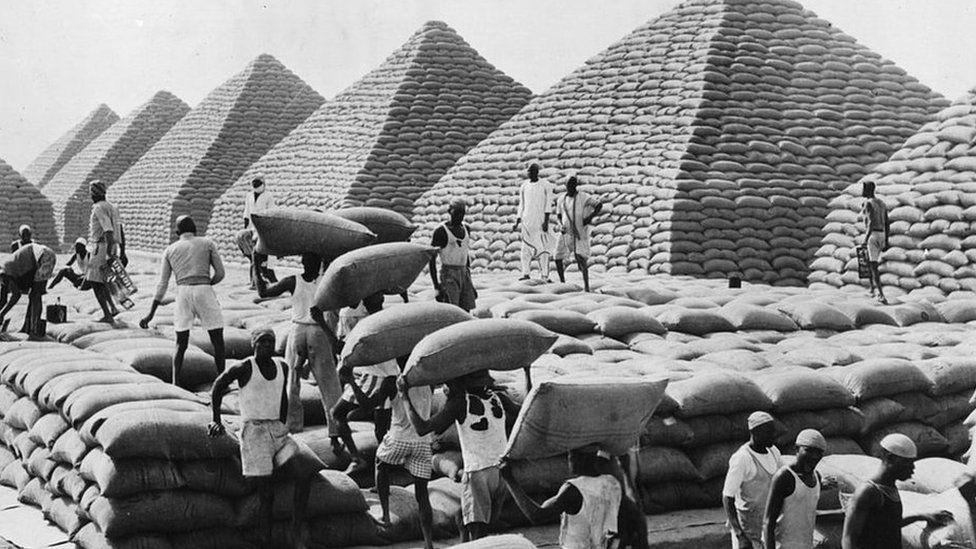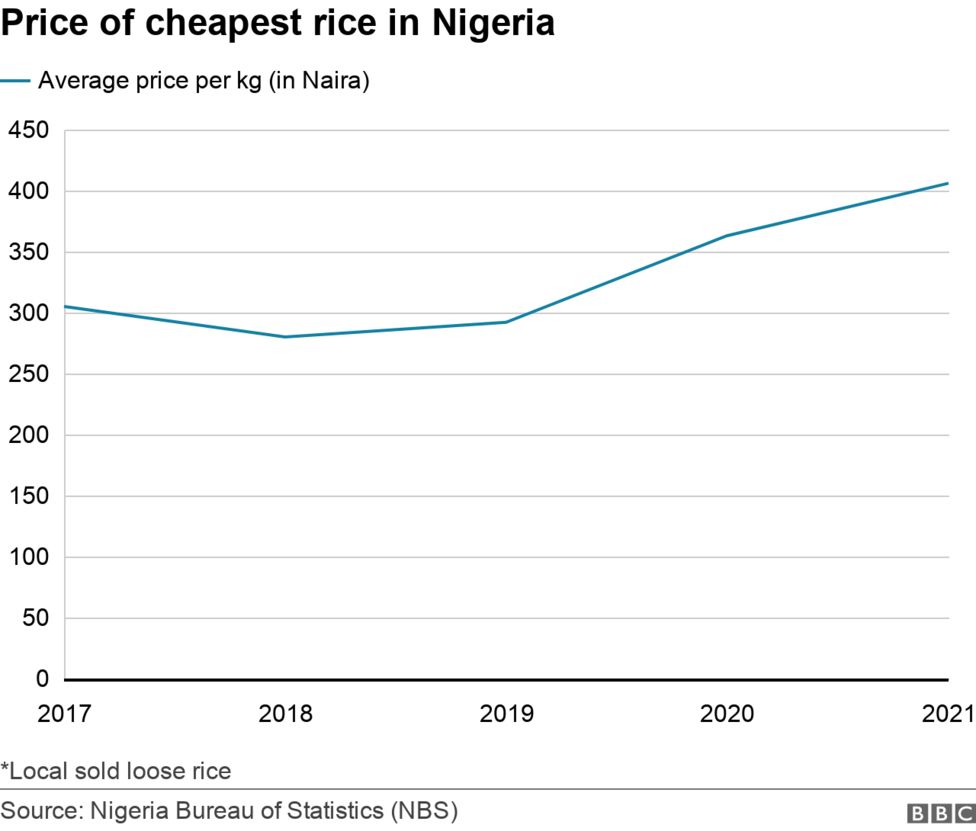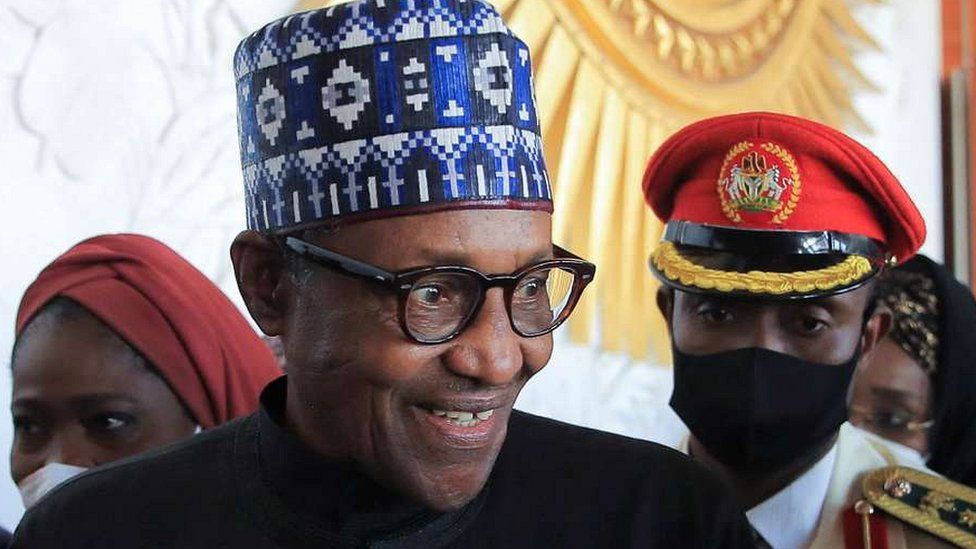The Nigerian government has hailed an increase in local rice production as a key achievement, and says the country is actually exporting the grain.
But the opposition has challenged this claim, saying production figures have been inflated.
Has production been exaggerated?
The opposition Peoples Democratic Party (PDP) says it believes the ruling All Progressives Congress party is exaggerating the growth in local rice production.
"If indeed there has been an increase in local rice production, that should be reflected in the marketplace [prices]," PDP spokesman Debo Ologunagba told the BBC.

The most recent reliable figures for production come from the US Department of Agriculture, which has projected that Nigeria's rice production will reach five million tonnes in 2022, slightly above the previous year.
The US data show a significant increase in production between 2015 and 2017, which then slowed before another jump in 2020 when production reached a high point of 5.04 million tonnes.
The Nigerian government has data on rice production also showing a big rise between 2015 and 2016. But it does not have any figures for the last few years.
What is behind rising production?
The area under rice cultivation has expanded.
It grew from about 3.1 million hectares (7.7 million acres) in 2015 to 5.9 million hectares in 2018, and then dropped to 5.3 million hectares in 2020 - the latest year for which we have UN Food and Agriculture Organization (FAO) data.
The government has been providing improved seedlings and fertiliser to smallholder farmers, and invested in irrigation schemes.
In 2014, a scheme to help farmers hire machinery was introduced to improve mechanisation, and in some states, regional governments have granted land concessions as an incentive to large commercial farmers.
In November 2015, the Central Bank of Nigeria launched a programme, under which farmers receive loans at favourable rates. Farmers can opt to pay them back with part of their produce.
The recent display of rice pyramids in Abuja to showcase the success of rice production evoked earlier times when Nigeria's groundnut (peanut) production was a key part of the economy.

Similar structures were built from sacks of peanuts, and were viewed as a tourist attraction and a symbol of the country's wealth.
So why are rice prices rising?
President Muhammadu Buhari has said improved production "will aid our efforts at reducing the price of rice in Nigeria".
But the price of rice - which is now one of the country's staple foods - has been rising.

Government data also show the cost of producing rice in Nigeria has been rising, which would translate into higher prices.
And while the production of rice has nearly doubled in a decade, the demand for rice has also been growing.
"The increase in the quantity of rice [produced] is also being met with increasing demand due to population growth," says Khadijat Amolegbe, from the University of Ilorin.
Conflict between herders and farmers in the north-west and central parts of Nigeria in recent years has also affected prices, by displacing rice farmers from their farms.
"Previously cultivated lands are not used due to fear of being killed or kidnapped," she says.
However, it is not clear how many farmers have been affected or how great an area of rice production has been lost because of insecurity.
Challenges in transportation because of bad roads have also pushed up prices.
Domestic consumption is currently estimated at seven million tonnes, according to US data, leaving the country with a shortfall of two million tonnes.
Rice is being imported
To meet the shortfall, the country has been importing rice, which in some cases appears to come in through smuggling.
Mr Buhari last month denied that rice was imported. "Now [in] Nigeria we produce the rice we need and we even export," he told a local TV station.
There is no official data for exports, and we could not establish from the government what the evidence is for that.
As for imports, Nigeria has had restrictions in place since 2015 in a bid to boost local production. These included:
- denying importers access to foreign currency
- banning rice imports from neighbouring countries
- slapping a 70% tax on rice imported from elsewhere

Despite the official claim that Nigeria does not import rice, a US government report estimated that in Nigeria, imports have been running at about two million tonnes in recent years.
A Nigerian Senate committee in December 2021 came up with the same figure, which it said "is either imported or smuggled illegally into the country".
Latest Stories
-
GPL 2024/2025: Accra Lions remain bottom after draw against Kpando
11 mins -
NDC condemns Dela Edem’s ‘unsavoury and distasteful’ about kufuor; issues public apology
21 mins -
‘Let them burn the sea; don’t return if Parliament is recalled’ – Asiedu Nketiah to NDC MPs
37 mins -
Bawumia’s commitment to excellence will ensure Ghana fulfills its potentials – Prof. Etse Sikanku
43 mins -
Ensign Global College marks 10th anniversary with 9th congregation
50 mins -
Over 80 educational projects to be commissioned this week
4 hours -
Kuami Eugene shows leadership; mobilises fellow artistes for peace song
6 hours -
The JOY Prime Made in Ghana Fair: Why not miss it!
6 hours -
GPL 2024/25: Struggling Asante Kotoko aim to bounce back against high-flying Nations FC
6 hours -
GES Deputy D-G admonishes students to uphold integrity and teamwork
7 hours -
Election 2024: Osabarima Dr Owusu Beyeeman advocates for peace
7 hours -
Fashion at Joy Prime Made in Ghana Fair
9 hours -
Alan Kyerematen wanted me to be his running mate – Okyeame Kwame
9 hours -
AFCON 2025Q: Otto Addo calls up Jerry Afriyie, two others for Niger clash
11 hours -
Vacant Seats: Supreme Court failed to strengthen Ghana’s democracy – NDC’s Beatrice Annan
11 hours

